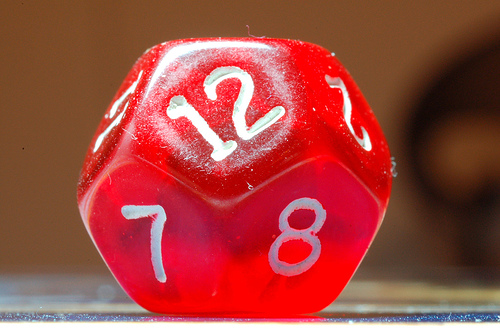
GeeksDreamgirl has an interesting take on using Dungeons & Dragon dice to stimulate your musical creativity.
Here’s her take on two of the more important dice:
d8
The d8 is perfect for learning scale degrees and practicing sight-singing.
Your first step is to grab a piece of staff paper and write out the scale you’re going to sight-sing in, numbering your scale degrees:
1. do
2. re
3. mi
4. fa
5. so
6. la
7. ti
8. do (upper)Now, throw your d8 several times, writing down the resulting notes on the paper. You can start on do if you want. Once you’ve gotten a line of notes, sing it! Add rhythms or alternate octaves if you want to add a challenge.
d12
The d12 is Schoenberg’s dream die. Music majors, rejoice! Now the dice gods can determine your tone row for you.
The d12 is also excellent for all you wind players who have to do scale competencies in order to pass band. Pair it with the d4 for maximum torture… I mean, practice value.
1. C
2. C#/Db
3. D
4. D#/Eb
5. E
6. F
7. F#/Gb
8. G
9. G#/Ab
10. A
11. A#/Bb
12. BRoll for your key!
Aleatoricism may have had its heyday in the 60’s, but it’s still an important tool for many electronic musicians. I like the idea of bringing more ideas from gaming into electronic music.
Image: Hugh Nelson

I’m glad you liked my article!!
12 sided dice. 12 disciples in the bible. Casting lots (dice) because on certain ocassions they (the writes of the biblical texts) could not hear from the biblical god? or only b4 they experienced a holy ghost experience? True or false? Greek mythology, dungeons and dragons… fun and fantasy somewhat like: Santa claus, tooth fairy (toof), he he) Jack and the beanstalk, the pied piper, noahs ark, or easter bunny? based on fantasy, or on some actual existence, experience, beliefs, or supernatural occurance? Im not making fun, i really am curious.
John Steven grissom stevegtexas@aol.com Fort Worth Texas USA.